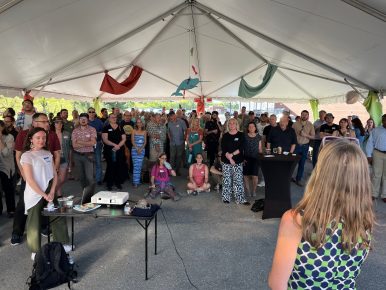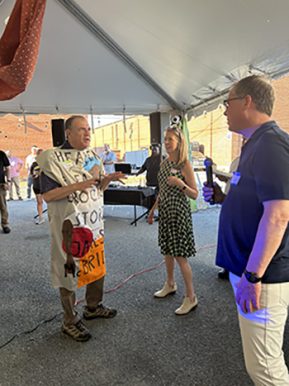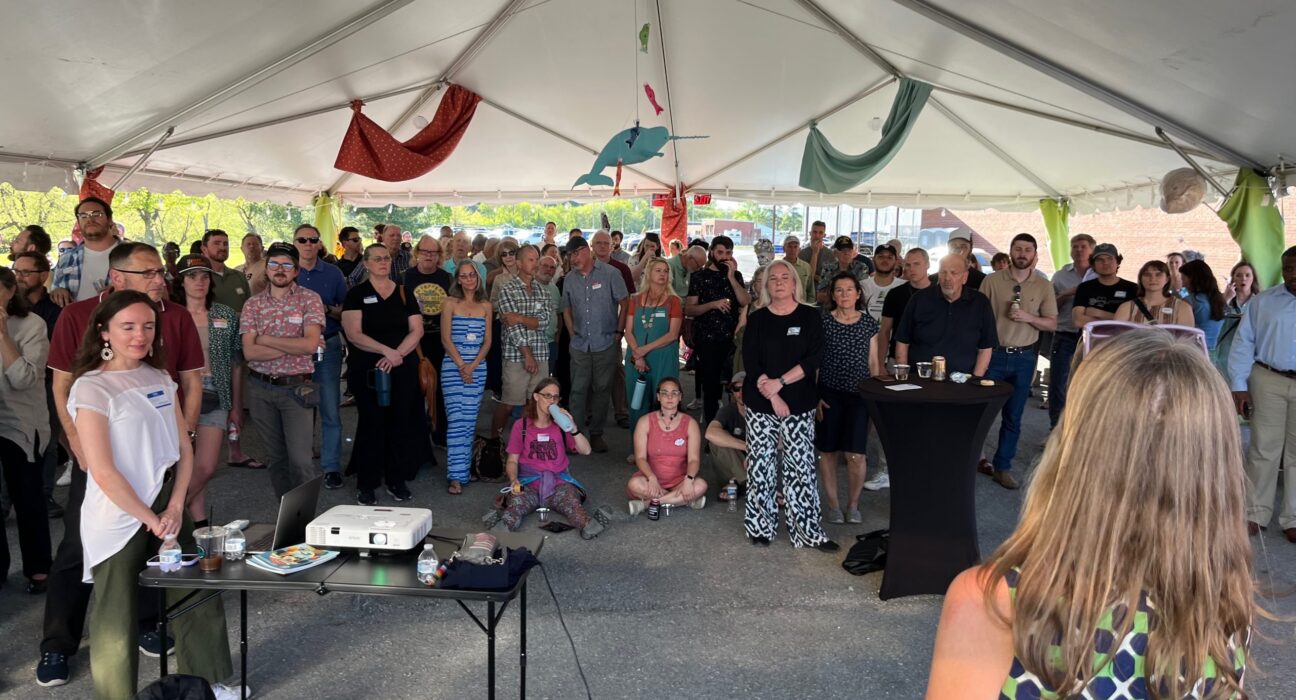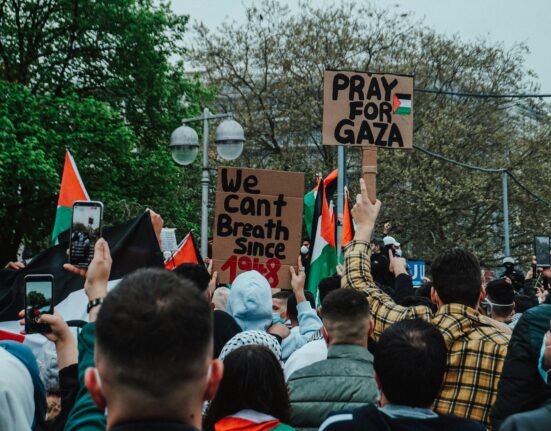Minnesota-based Artspace studies Riverdale redevelopment
Published

Roanoke developer Ed Walker first tried to lure Artspace, a Minnesota-based nonprofit real estate developer for the arts, to Roanoke for one of his early redevelopment efforts in the early 2000s, when he was transforming a former 1925 cotton textile mill into downtown living spaces. Artspace essentially ghosted him back then.
“It’s very, very, very, very difficult to get Artspace’s attention and to get them interested in a community,” Walker said. “I tried 25 years ago. It’s like trying to date somebody that just isn’t interested.”
However, Artspace sure seems to be swiping right on Roanoke these days.
On April 18, Walker held a celebration marking the first anniversary of his Riverdale mixed-use development, where he has committed to invest at least $50 million through 2040 to redevelop a 120-acre, former rayon manufacturing site into residences, offices, retail outlets and eateries, with amenities such as outdoors-focused programming.
Wendy Holmes, senior vice president of Artspace, along with Greg Handberg, the nonprofit’s senior vice president of properties, and Kelli Miles, an Artspace project manager, visited the Riverdale celebration to deliver a presentation to a few hundred folks who turned out for the event, which was held underneath a tent populated with a sprinkling of folks dressed in costumes borrowed from the city’s recent Daisy Art Parade, including at least one roving, human-size chicken.
“We’re just really so excited about the potential here at Riverdale and here in Roanoke,” Miles told the crowd, who responded with cheers. “This potentially could be our very first actual brick-and-mortar project in Virginia. ”
After conducting a six-month preliminary feasibility study that concluded in January and an arts market study in the first quarter of this year, Artspace leaders think the Riverdale development site could support up to 44 private studio spaces and up to 67 live/work housing units for artists and their households who make up to 80% of the area median income, which is $48,350 for a one-person household. Shared spaces, like gallery space, a clay studio and rehearsal spaces, could also be part of the development.

Next, Artspace will work to identify sources of pre-development funding from public and private sources. “It’s typically $800,000 over a three-year period of time while we put the funding applications together for the capital costs,” Holmes said.
While it’s too early to estimate exactly how much the project will cost, Holmes guessed that it might come in between $12 million and $20 million, covered by a mix of private and public financing. Artspace, which will own the property, will likely hire a local property management company to oversee it.
The Roanoke Artspace development won’t happen overnight, though. The best-case scenario would be that construction could begin in 2026, according to Handberg.
Monthly rents would range from $480 for an efficiency to $617 for a two-bedroom apartment, according to Holmes — “so, very affordable for your market,” she said.
Artspace officials have studied the Riverdale complex and identified a few buildings that could fit the project, according to Holmes.
“So, we’re super-excited to match the data now with the physical opportunity,” she said.
As part of Walker’s agreement with the city, the developer will invest $50 million over the next 16 years to create a mixed-use development at Riverdale that will include commercial, residential and retail components. Artspace’s housing and creative spaces would occupy just a small part of the sprawling Riverdale complex.
Founded in 1979, Artspace creates affordable housing and creative spaces for artists. The organization has developed 58 projects in 22 states, including the South Main Artspace lofts in Memphis, Tennessee, and the Tashiro Arts Building in Seattle.
When Artspace first began talking with Walker, the organization’s leaders made it clear that the entire region would need to rally around the idea of creating housing and spaces for its artists.
“We said, ‘Ed, it has to be more than about you,’” Holmes said. “We need the city. We need the state. And most importantly, we need the artists.’ And he said, ‘We have all that.’ And so we believed him, and it was true.”
Since last summer, Artspace officials have held meetings with Roanoke-area cultural leaders from marginalized communities to discuss space needs and equity issues. They have also met with Roanoke’s economic development leaders and city officials, ad well as leaders from banks, foundations, Carilion and Virginia Tech to talk about potential financing.
“Ed is true to his word,” Holmes said. “He knows how to bring all these people together.”
The City of Roanoke has pushed over the last couple decades to support art as a driver for cultural and economic growth. In 2002, Roanoke City Council members approved a plan to use 1% of the construction cost of projects in the city’s capital improvement plan to purchase public art. In 2011, council members adopted the city’s first Arts and Cultural Plan, a document integrating arts and cultural efforts into the city’s comprehensive planning.
Today, dozens of pieces of public art can be found around the city. Last year, Roanoke’s city government won a $75,000 matching grant from the National Endowment for the Arts to develop the Arts Connect Neighbors program, which brings artists into local neighborhoods for performances or workshops.
A 2019 study put together by Washington-D.C. nonprofit Americans for the Arts reported that arts and culture generated $64 million annually for the city’s economy.
Making sure artists can afford housing is a way to keep them in the community, according to Douglas Jackson, Roanoke’s arts and culture coordinator. “I think it is economic development,” he says of the effort to bring the Artspace housing project to Riverdale.







